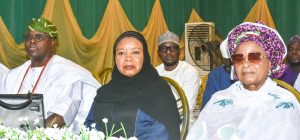
By Michael Kalu
Ecobank Nigeria’s once formidable grip on the banking market is beginning to loosen as recent financial indicators show the lender losing share to more agile competitors. Amid tightening regulatory requirements and mounting capital adequacy pressure, the bank faces a growing challenge in sustaining profitability and balance sheet strength.
Industry analysts attribute the slide to a combination of thin capitalization buffers, slow asset growth, and intensified competition from tier-one banks aggressively expanding retail and digital footprints. The development underscores broader concerns about the capital resilience of mid-tier lenders navigating Nigeria’s volatile macroeconomic environment and evolving prudential benchmarks.
The bank’s risk-adjusted capital adequacy ratio (CAR) declined to 7.9% as at 31 December 2024 from 11.3% previously as the risk assets continued to be impacted by, Naira devaluation.
The regulatory capital adequacy ratio also fell short of prudential standards (set at minimum 10%) at 5.7% during the same period.
The bank aims to remedy its capital position via selling off loans and through injection of $200 million in additional tier 1 (AT1) capital over the next 12 to 18 months.
In the meantime, the bank has curtailed lending, while exchange rate stability should help minimize RWA volatility over the outlook period (12 to 18 months).
“We expect the bank’s capitalisation to remain weak pending the materialisation of the above-stated interventions, with the GCR core capital ratio ranging between 7.5% and 10.0%,” GCR Ratings said in an update.
Ecobank Nigeria’s weak competitive standing is reflected by a declining market share. As of September 2025, gross loans declined by 9.1% to N2.3 trillion from N2.5 trillion as of December 2024 while customer deposits have only increased by 1.5% during the same period.
The downward trend could persist over the outlook period, as the bank navigates a highly competitive banking landscape and a challenging macroeconomic environment, according to GCR Ratings.
“Furthermore, internal pressures stemming from weak asset quality and insufficient capital buffers could further constrain the bank’s ability to regain lost market share,” GCR Ratings said.
The bank’s risk position remains concerning as the ratio of gross non-performing loans (NPL) remained high at 9.4% as of August 2025, from 9.3% in December 2024 (December 2023: 9.1%).
The increase in cost of risk from 1.7% to 2.7% between December 2024 and June 2025 reflects weaker asset quality due to migrations to the stage 3 bucket.
Despite higher provisioning, potential credit losses are not fully covered as Stage 3 loan coverage stood at 46.4% as of June 2025 from 39.9% in December 2024. In addition, the loan book remains highly concentrated, with the top 20 obligors accounting for 75.0% of total loans as of June 2025, and the top 10 breaching the single obligor limit.
As part of its transformation strategy, the bank has focused on growing low-cost current and savings account (CASA) deposits, improving the CASA ratio to 74.5% in December 2024 from 56.9% in 2023.
This shift contributed to the reduction in cost of funds to 5.7% in June 2025 from 6.7% in December 2024.
Ecobank Nigeria benefit’s from the bank’s affiliation with ETI which has an extensive cross-border network.




**memory lift**
memory lift is an innovative dietary formula designed to naturally nurture brain wellness and sharpen cognitive performance.
This is a great article, i am simply a fun, keep up the good work, just finish reading from https://websiteerstellenlassenbamberg.de// and their work is fantastic. i will be checking your content again if you make next update or post. Thank you
This is a great article, i am simply a fun, keep up the good work, just finish reading from https://websiteerstellenlassenbamberg.de// and their work is fantastic. i will be checking your content again if you make next update or post. Thank you
Đến với J88, bạn sẽ được trải nghiệm dịch vụ cá cược chuyên nghiệp cùng hàng ngàn sự kiện khuyến mãi độc quyền.
kuwin sở hữu kho game đa dạng từ slot đến trò chơi bài đổi thưởng, mang đến cho bạn những giây phút giải trí tuyệt vời.
kuwin sở hữu kho game đa dạng từ slot đến trò chơi bài đổi thưởng, mang đến cho bạn những giây phút giải trí tuyệt vời.
苹果签名,苹果超级签平台,ios超级签平台ios超级签苹果企业签,苹果超级签,稳定超级签名
搭载智能站群程序,自动化搭建与管理,为SEO项目提供核心驱动力。站群程序
kuwin sở hữu kho game đa dạng từ slot đến trò chơi bài đổi thưởng, mang đến cho bạn những giây phút giải trí tuyệt vời.
Tham gia cộng đồng game thủ tại Go88 để trải nghiệm các trò chơi bài, poker phổ biến nhất hiện nay.
iwin – nền tảng game bài đổi thưởng uy tín, nơi bạn có thể thử vận may và tận hưởng nhiều tựa game hấp
kuwin sở hữu kho game đa dạng từ slot đến trò chơi bài đổi thưởng, mang đến cho bạn những giây phút giải trí tuyệt vời.
Tham gia cộng đồng game thủ tại Go88 để trải nghiệm các trò chơi bài, poker phổ biến nhất hiện nay.